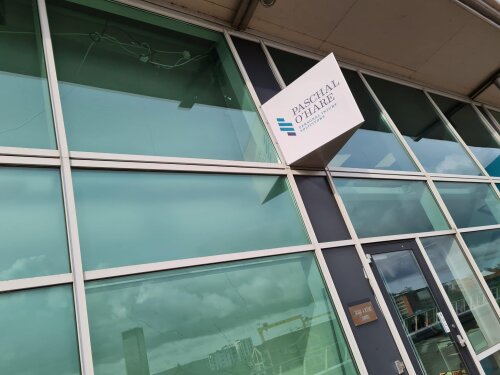Best Marine Insurance Lawyers in Belfast
Share your needs with us, get contacted by law firms.
Free. Takes 2 min.
List of the best lawyers in Belfast, United Kingdom
About Marine Insurance Law in Belfast, United Kingdom
Marine insurance covers risks to ships, cargo, freight, liabilities to third parties, and related maritime exposures. In Belfast and the rest of Northern Ireland, marine insurance sits at the intersection of maritime law, contract law and insurance regulation under UK law. The core statutory and common law principles that govern marine insurance in the United Kingdom also apply in Northern Ireland, but local courts and practice can affect how disputes are handled. Key commercial sectors in Belfast - including port operations, ship repair, cargo handling and offshore support - commonly use hull and machinery policies, cargo policies, and protection and indemnity arrangements.
Why You May Need a Lawyer
Marine insurance cases often involve complex facts, technical evidence, and strict legal rules. You may need a specialist solicitor if you face any of the following situations:
- A claim has been denied or only partially paid and you need to challenge the insurer.
- A large loss has occurred - for example a hull total loss, constructive total loss or major cargo damage - and you need advice on valuation, salvage and subrogation.
- There are disputes over policy terms - such as the scope of cover, warranties, exclusions, or the insurer's remedies for breach.
- You face third-party liability claims arising from collision, pollution, injury or property damage and need to respond to P&I club or insurer actions.
- Your vessel or property has been arrested, detained or subject to salvage claims and immediate steps are required to protect rights and limit costs.
- There are potential professional negligence issues involving brokers, surveyors or shipyards that contributed to a loss.
- You need representation in court, arbitration or mediation to resolve a contested claim or recover subrogated losses.
Local Laws Overview
Key legal features relevant to marine insurance in Belfast include:
- Statutory framework - The Marine Insurance Act 1906 establishes fundamental principles such as utmost good faith, warranties and indemnity measure. More recent UK reforms affecting commercial insurance - notably the Insurance Act 2015 - have changed the rules on pre-contract disclosure, warranties and remedies and will be relevant to many commercial marine policies.
- Carriage and liability rules - The Carriage of Goods by Sea Act and international conventions such as the Hague-Visby Rules influence cargo carrier liability and can affect insurers and claims handling.
- Admiralty and maritime jurisdiction - Maritime claims in Northern Ireland are handled through the Northern Ireland courts, with civil and admiralty jurisdiction exercised by the local High Court. Admiralty practice can differ in procedure from general commercial litigation.
- Regulatory environment - Insurers and intermediaries are regulated at UK level - principally by the Financial Conduct Authority and Prudential Regulation Authority - which sets conduct and prudential standards. Policyholder complaints can be escalated to the Financial Ombudsman Service and insolvency of an insurer may engage the Financial Services Compensation Scheme.
- Salvage and wreck - International salvage conventions and domestic law on salvage, general average and wreck apply. Salvage awards and general average contributions may create immediate cash calls and practical obligations for cargo interests and shipowners.
- Limitation and time limits - Time limits for bringing claims can be strict and may vary depending on the type of claim, the contract and applicable conventions. Prompt action is essential to preserve rights.
Frequently Asked Questions
What exactly does marine insurance cover?
Marine insurance can cover physical loss or damage to hulls and machinery, loss or damage to cargo, loss of freight, liabilities to third parties such as collision or pollution, and operational risks. Cover is governed by the specific policy wording - which defines covered perils, exclusions, limits and deductibles - so you should read the policy closely or get legal advice to interpret it.
Does the Marine Insurance Act 1906 still apply in Belfast?
Yes. The Marine Insurance Act 1906 is a foundational statute for marine insurance across the United Kingdom, including Northern Ireland. However, later reforms to insurance law, such as the Insurance Act 2015, have changed some rules that affect commercial insurance practices. Both statutory law and case law are relevant, so specialist advice is often needed to apply the law to specific facts.
What should I do immediately after a maritime loss?
Notify your insurer and broker promptly in accordance with the policy notice requirements, preserve evidence and documentation, take reasonable steps to mitigate further loss, and appoint a qualified marine surveyor or loss adjuster if needed. Keep a clear contemporaneous record of events, communications, and expenses. If safety, salvage or arrest is involved, seek immediate legal and technical advice.
What is the insurer's duty - can they refuse to pay if I made a mistake before the contract?
For commercial marine policies, there is a duty of fair presentation and a continuing obligation to disclose material information before contract inception. The Insurance Act 2015 reformed the consequences of non-disclosure and misrepresentation for commercial contracts, replacing some older, harsher rules. Depending on the circumstances, an insurer may be entitled to certain remedies if material facts were not disclosed, but automatic avoidance is not always the result. Specialist advice is needed to assess any alleged breach.
What are warranties and why are they important?
Warranties are contractual promises in a policy about facts or conduct - for example, that a vessel will be equipped in a certain way or that certain routes will be avoided. Traditionally, breach of a warranty could discharge the insurer from liability even if the breach was unrelated to the loss. Reforms have limited some harsh outcomes for commercial contracts, but warranties remain important and can still affect coverage - so any alleged breach should be taken seriously.
What is the difference between actual total loss and constructive total loss?
An actual total loss occurs when the insured property is destroyed or irretrievably lost. A constructive total loss arises when the cost of recovering and repairing the property would exceed its value, or when the insured reasonably abandons the property to the insurer. Declaring a constructive total loss has specific legal and procedural consequences and must follow the policy wording and applicable law.
How long do I have to bring a marine insurance claim?
Limitation periods vary by claim type, contract terms and applicable conventions. In general commercial practice, limitation windows can be strict. There may also be short notice periods in policies for pursuing arbitration or legal proceedings. Because the applicable time limit can depend on multiple factors, consult a solicitor promptly to avoid losing your rights.
Can I challenge an insurer that denies my claim?
Yes. You can challenge a refusal through the insurer's internal complaints process, escalate to the Financial Ombudsman Service for eligible disputes, or bring court or arbitration proceedings where appropriate. Before proceeding, gather all relevant evidence, copies of correspondence and the policy wording, and obtain legal advice to assess likelihood of success and to preserve remedies like subrogation or mitigation.
What are salvage and general average and how do they affect my position?
Salvage refers to compensation to parties who voluntarily assist a ship or cargo in danger. General average is an equitable principle where losses deliberately incurred for the common safety are shared pro rata by all interested parties. Both can lead to immediate financial demands, security requirements and documentation obligations. Insurance often covers such costs, but claims must be managed carefully and in line with policy terms.
Should I use arbitration or court to resolve a dispute?
Many maritime contracts include arbitration clauses, and arbitration is commonly used in international maritime disputes because it can be faster, confidential and specialist. Courts remain important where injunctive relief, vessel arrest, or certain remedies are needed. Choice of forum depends on the contract, the relief required, cost considerations and enforceability. A specialist lawyer can advise on the best forum for your circumstances.
Additional Resources
Below are organisations and bodies that can assist or provide authoritative information for people dealing with marine insurance issues in Belfast:
- Law Society of Northern Ireland - for finding a specialist maritime or insurance solicitor and for professional guidance on legal representation.
- Northern Ireland courts and Northern Ireland Courts and Tribunals Service - for information on civil and admiralty procedure in local courts.
- Maritime and Coastguard Agency - national maritime safety regulator and a source of guidance on shipping safety and marine incidents.
- Financial Conduct Authority and Prudential Regulation Authority - regulators of insurers and intermediaries in the UK, including conduct and solvency standards.
- Financial Ombudsman Service - for handling consumer and some business complaints against insurers where appropriate.
- Financial Services Compensation Scheme - provides information about protection if an insurer becomes insolvent.
- Belfast Harbour and local port authorities - local operational bodies with practical information for port users and cargo interests.
- P&I clubs and the International Group of P&I Clubs - resources for liability cover and claims handling protocols.
- Professional marine surveyors, loss adjusters and salvage firms - for technical evidence and immediate incident response.
Next Steps
If you need legal assistance for a marine insurance matter in Belfast, consider the following practical steps:
- Act quickly - time limits and operational obligations can be strict. Early action preserves legal and commercial remedies.
- Collect and preserve evidence - keep contracts, policy documents, correspondence, survey and repair reports, photographic evidence and voyage records.
- Notify your insurer and broker in accordance with policy terms - follow notice and mitigation obligations to avoid dispute over abandonment or late reporting.
- Appoint technical experts - a qualified marine surveyor and, where appropriate, a loss adjuster or salvage team can secure evidence and limit loss.
- Seek specialist legal advice - contact a solicitor experienced in marine and insurance law who can review your policy, advise on rights and remedies, and represent you in negotiations, arbitration or court proceedings.
- Use professional bodies to find representation - the Law Society of Northern Ireland can help you find accredited solicitors with maritime and insurance experience.
This guide provides an introductory overview and practical starting points. For advice tailored to your situation, consult a qualified solicitor with experience in marine insurance law in Northern Ireland.
Lawzana helps you find the best lawyers and law firms in Belfast through a curated and pre-screened list of qualified legal professionals. Our platform offers rankings and detailed profiles of attorneys and law firms, allowing you to compare based on practice areas, including Marine Insurance, experience, and client feedback.
Each profile includes a description of the firm's areas of practice, client reviews, team members and partners, year of establishment, spoken languages, office locations, contact information, social media presence, and any published articles or resources. Most firms on our platform speak English and are experienced in both local and international legal matters.
Get a quote from top-rated law firms in Belfast, United Kingdom — quickly, securely, and without unnecessary hassle.
Disclaimer:
The information provided on this page is for general informational purposes only and does not constitute legal advice. While we strive to ensure the accuracy and relevance of the content, legal information may change over time, and interpretations of the law can vary. You should always consult with a qualified legal professional for advice specific to your situation.
We disclaim all liability for actions taken or not taken based on the content of this page. If you believe any information is incorrect or outdated, please contact us, and we will review and update it where appropriate.









